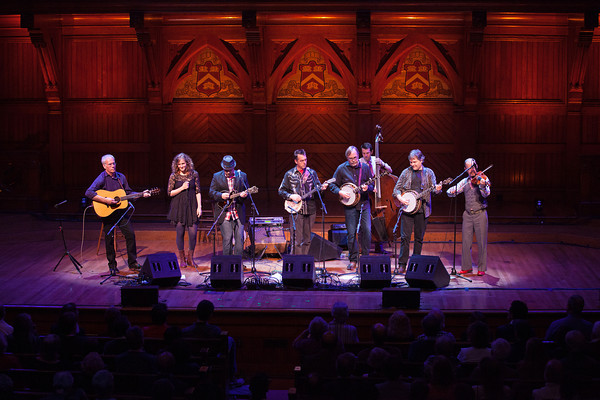
News
Summers Will Not Finish Semester of Teaching as Harvard Investigates Epstein Ties

News
Harvard College Students Report Favoring Divestment from Israel in HUA Survey

News
‘He Should Resign’: Harvard Undergrads Take Hard Line Against Summers Over Epstein Scandal

News
Harvard To Launch New Investigation Into Epstein’s Ties to Summers, Other University Affiliates

News
Harvard Students To Vote on Divestment From Israel in Inaugural HUA Election Survey
Banjo Summit Scales Musical Heights

In the last 20 years, there has been a significant revival of interest in folk and Americana among a new generation of artists. This trend is largely tied to the explosion of popularity of indie bands and musicians, who possess an acoustic aesthetic that hearkens back to the old musical traditions of this country—artists such as Mumford and Sons, Sufjan Stevens, the Lumineers, and Edward Sharpe and the Magnetic Zeroes. On Thursday, Sanders Theatre hosted Béla Fleck’s Banjo Summit, a concert that featured several of the greatest banjo players alive today, some of whom date back to the historical revival era of American banjo music in the 1960s and 1970s and some of whom have begun their musical careers relatively recently. The event conveyed this historical continuum with unparalleled vigor and joy.
The event was presented by the Celebrity Series of Boston, which is now in its 75th year. The caliber of the artists on hand was astonishing; even those who do not frequently listen to bluegrass are familiar with the work of an artist like Eric Weissberg, composer of the classic “Dueling Banjos,” who is also known for his work with Bob Dylan on the album “Blood on the Tracks.” The headline artist, Béla Fleck, was personal friends with the late giant and influential bluegrass musician, Earl Scruggs. These artists were two of seven banjo players participating in this event, all great innovators in the practice of the instrument from every period of its development in the last 50 years. The event highlighted a cross-section of banjo history and a diversity of musical styles.
The concert’s first number, “Cripple Creek,” was an especially striking example of the continuity and tradition conveyed by the program. The band played accompaniment continuously while each performer came onstage separately to perform a solo, creating a rich tapestry of individual styles set into a unified work. As the concert went on, the continuity was emphasized in the introductions each artist gave to the pieces he or she was playing, which referred not only to the artists on stage, but also to other musical giants who had influenced him or her and with whom that artist had worked.
Fleck, a much-decorated musician with multiple Grammys to his name back to 1998, dominated much of the show, especially the second set, and provided a thematic center for the concert. While remaining rooted in the old traditions of the instrument, he pioneered the use of the banjo as something greater than a folk instrument, as evidenced by his new album “The Imposter,” which was recently released on Decca and from which he played a selection for the concert. The work on “Imposter” is dominated by classical structures in conjunction with folk motifs, shot through with light, dancing banjo lines which recall Strauss’s use of the zither in “Geschichten aus dem Wienerwald.” Fleck’s performance of a solo arrangement of the Banjo Concerto from the album not only displayed his astounding technical skill, but also his canny nature as a performer. Throughout this piece, he communicated the audience without detracting from the music, evoking laughter by a gesture or facial expression after a particularly fanciful passage or drawing the audience in with the raw intensity of his focus on the instrument. His unassuming stage persona was likable and engaging in a mild, self-effacing way. After the show’s intermission, he asked from the stage with gentle irony, “You all are still here?”
This lack of pomposity characterized much of the show. Weissberg, before beginning his first number, said to the theater, “I’ve got a question for you all. Did all you people come here on purpose?” Such humility from masters of any art is always a heartening thing to hear, and it fostered the sense of unity conveyed by the concert’s arrangement.
The excellence of this event is in keeping with the work presented in the Celebrity Series of Boston, which brings exceptionally talented artists to perform in and around Boston. This season, the Series will feature other artistic masters such as Wynton Marsalis, Joshua Bell, Yo-Yo Ma, and graphic novelist Art Spiegelman, known primarily for his work “Maus,” who will be speaking in Sanders Theatre in May.
Béla Fleck’s Banjo Summit had flawless sound engineering, a rare feat for an all-acoustic concert. In addition to being an artistically successful concert, it was also an amazing testament to the development of the banjo tradition over time.
Want to keep up with breaking news? Subscribe to our email newsletter.
